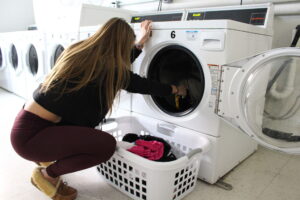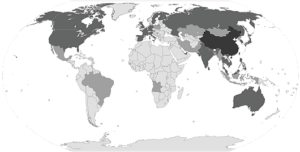Tag: Julia McCoy ’22
Careers During COVID-19: How Will the New Job Market Affect PC Graduates?
by The Cowl Editor on October 1, 2020
Campus

Careers during COVID-19: How Will the New Job Market Affect PC Graduates?
by Julia McCoy ’22
Opinion Staff
It is clear that the COVID-19 pandemic has greatly impacted our small campus community. But how will it affect our lives after we leave Providence College and move on to the “real world?”
In addition to the changes we are facing on campus, it is impossible to ignore the changes in the job market over the past six months. Since the outbreak of COVID-19 in the United States in March, more than 50 million people have filed for unemployment.
More specifically, according to CNBC, 35% of people from the ages of 18 to 29 say that they have somehow been affected by this unemployment surge—this can include themselves or people in their family. These statistics are scary when students begin to consider life after college.
Additionally, unemployment rates among recent college graduates—from 2015 to 2020—have risen from 3.8% to 13.3% since March of this year. This number is certainly grim. But there are ways to combat this.
Luckily, students at the College are not alone. PC’s Center for Career Education is working diligently and adapting to each situation that is thrown its way. The class that can attest to this help the most is the class of 2020.
As Eileen Wisnewski, a career coach in PC’s Center for Career Education, explains, graduated seniors are given a “First Destination Survey” from the day after graduation until December of the same year asking them about career plans and job offers. If a student who has already graduated from PC needs help finding a job or practicing for an interview, they will be personally contacted by the Center for Career Education about setting up a coaching appointment.
Another program put in place to encourage students to think of life after PC is the Pivot Program. This, according to Wisnewski, was “designed to help students demonstrate professional development and gain skills while they were looking for a job or internship over the summer.”
The important thing to note is that the program was developed for both students returning this fall and those who already graduated in 2020. This proactive initiative from the Center for Career Education promises students that the Career Center will continue to provide coaching no matter the circumstances.
The Pivot Program brings up a great point: employers understand that times are tough right now, but they want to see how you are getting through it. Are you taking advantage of opportunities or are you waiting for the pandemic to end? It might seem like the world has stopped, but adapting to the circumstances is the best way to successfully get through it.
As Wisnewski pointed out, “The major shift we are seeing is having the entire hiring process conducted virtually at this time.” This could very well continue for a while after the pandemic is over, so we should face the inevitable and start preparing now.
One of the things to prepare for the most in starting a new job is certainly the orientation process. Even for Nicole Gass ’20, who is an essential worker, parts of her training were conducted over a video conferencing system. She learned about company policies and human resources information through online services and has since been able to transition to in-person work seamlessly. Her experience shows that many employers are working hard to ensure safe and easy transitions in unconventional ways during this difficult time.
Although Julia Lorkiewicz ’20 already had a job offer before the onset of the pandemic, she was worried that the changes in the job market and the rise in unemployment would have an effect on her future employment. She met with a career coach who she says “gave [her] peace of mind that eventually everything will work out.” In addition to this, Lorkiewicz completed various online programs, as her company is working fully remotely until at least 2021. Her advice is that everyone should take advantage of the new coaching appointments which helped her adapt to the new job market.
With everything currently going on in the world, it makes sense to feel uneasy about future employment and the way the world may look beyond our PC bubble. The only way to stay on top of things is to stay proactive and utilize the resources around you.
The world is rapidly changing, but PC and many companies around the world are adapting right along with it. Though the prospect of finding a job after graduation may seem daunting, it is important to remember that PC is providing a variety of resources that students may turn to in their efforts to excel.
Every Vote Counts: Why It is Important to Focus on Smaller Elections
by The Cowl Editor on September 17, 2020
Opinion
Every Vote Counts: Why It is Important to Focus on Smaller Elections
by Julia McCoy ’22
There is no doubt that this year will be defined by politics and governmental elections. Much of the attention in the media and conversation is focused on the presidential race that is to come on Nov. 3. While this is obviously a significant election, it is not the only ticket on the ballot. State and local elections, as well as congressional races, are just as impactful as the presidential election in terms of the effect they have on policy and law.
Though these smaller elections are always important, the recent events shaping today’s political climate have heightened the need for more media attention. For example, the Black Lives Matter movement has organized protests in large cities across the country. It is within the jurisdiction of state and local governments to determine how to deal with these protests. Responding to and meeting the demands of the protests falls within the jurisdiction of state and local governments, and they have the ability to create real change on this front.
In some states this year, President Trump chose to deploy the National Guard as a way to “protect” cities from protests that he personally deemed too violent. Since the policing of the protests was happening on a local level, governors were able to effectively reject this deployment and continue to handle the situation on their own.
When considering the ongoing stress of the COVID-19 pandemic, it is important to remember the unique nature of states and the fact that they are often quite different from one another. COVID-19 was more prevalent in some areas of the country than in others, and it affected local economies differently. In this case, it is more rational to look at state and local-level guidance than to turn immediately to the national stage.
With these pressing issues in mind, it is important to remember to stay involved and attentive regarding state and local elections. The people on those ballots are the most likely to directly impact the state or locality in which you live.
In addition, some congressional seats are up for election this year. On a national level, Congress controls the debate and passage of every single law that goes through Washington, D.C. Though bills must ultimately be signed into law by the President, this avenue is incredibly important and often shapes the language of our laws.
Currently, there is a Republican-run Senate and a Democrat-run House of Representatives. Oftentimes this leads to endless debates and little room for compromise. 35 out of 50 seats in the Senate and all 435 House seats are up for election come November. If more voters participate and pay attention to these elections, the landscape of the Capitol could drastically change, regardless of which party takes control.
These elections are incredibly significant when considered alongside the Presidential election. The current congressional situation is split, but one race could change it to be in favor of one party or the other. Because the White House is also in an election year, there is always a possibility that one party emerges victorious with control of both the legislative and executive branches.
It is, of course, important to remain focused on the issues surrounding a presidential election. Presidential elections only happen once every four years and they certainly have an effect on the landscape of our country and our political climate. The presidency, however, is not the only elected office that can impact the laws of our government. To stay up to date on smaller elections, which often have a direct impact on our lives, we must stay involved, be informed, and vote locally.
Tangents & Tirades
by Andrea Traietti on September 3, 2020
Opinion
Switch to Military Time
If you manage to make it through all four years at Providence College without incorrectly setting your alarm, consider yourself one of the few. The 12-hour clock system is unnecessarily confusing, and it can easily be the reason that you sleep through a class or meeting.
Although setting an alarm seems like a very simple task, it is far too easy to mistakenly set it for 8 o’clock at night instead of 8 o’clock in the morning. You may overlook the minor detail of switching the default option from p.m. to a.m., especially if you set your alarm at night while your eyes start to give up after a long day.
An easy solution to this is switching over to military time. After teaching yourself to stop keeping track of time in terms of a.m. and p.m., you will never run into alarm-setting issues again. Although this adjustment will take some getting used to, the 24-hour clock system will eventually become second nature, and it will even help you brush up on your math skills in the meantime by forcing you to do conversions in your head.
Even if you have never been guilty of setting the wrong alarm, it will not hurt to proactively make the switch. The 12-hour clock system is ambiguous and more complicated than it needs to be, and seeing that a more simplified system exists, why not take advantage of it?
—Kelly Wheeler ’21
“Normalcy” in Online Classes
Online class might seem like a luxury on a Monday morning at 8:30, as some could see it as an opportunity to stay in bed for as long as possible, lounge around, and simply log onto Zoom at 8:29.
This, however, might be a poor plan if you are hoping to make this year feel as “normal” as possible. Instead, it might be beneficial to act as if your class is in-person. Getting into a routine can be a great source of motivation to stay on track, even if most classes are in your room.
One example of this is simple: clothes. How we dress can determine the way we feel for the rest of the day. Although it is tempting to sit in sweatpants all day— and it might happen on more days than not— it might be wise to consider taking the time to pick out outfits that feel presentable. Oftentimes, feeling confident in your outfit translates to confidence in class. This is the case for in-person classes, so it is easily translatable to online classes.
In addition, it is important to take proper notes and focus in class. Although there are many distractions around, including phones and other tabs on a laptop, it is important to stay focused on the Zoom screen, as if you were in class. Be sure to participate and actively engage to make the most of your education. Just because the location of your class may have changed, this does not necessarily mean expectations have.
—Julia McCoy ’22
Where Are the Women? Fitting More Female Voices into the DWC Curriculum
by Andrea Traietti on March 5, 2020
Opinion

by Julia McCoy ’20
Opinion Staff
Providence College was once an all-male college. Luckily, the statistics today reflect a nearly split population of young men and women. But has our curriculum changed to fit the times?
Anyone that tours PC will soon know what course students consider the most important—the Development of Western Civilization. A staple in our coursework for the first four semesters of college, DWC is meant to teach us the most important aspects of western civilization from the beginning of recorded history until now.
When covering the defining moments of our history as humankind, it is important to ask: where are the women? The history that we prioritize is not particularly inclined to be inclusive of women in the arts or sciences. As a result, there is a significant drought in female writing and thought in this course.
Though DWC certainly does a good job of comprehensively covering the entire history from ancient to modern times in four semesters, a diversity in the gender of our authors and key figures would certainly be a beneficial change to the program. Prioritizing a variety of perspectives has certainly been a talking point over the last few years, and it should continue to develop until all people are represented in the DWC syllabus.
Certain professors and DWC teams have made strides in terms of diversifying the perspectives they include in their DWC syllabi, but not all share this experience.
Regarding how she constructs her own syllabi and conversations, Dr. Jennifer Illuzi said, “When we start asking the right questions, it’s not a matter of ‘including’ women’s voices, or Black voices, but of doing justice to the complexity of the concept of ‘western’ and how that came to be a category of identification that seems meaningful.”
She added, “We’re also spinning out the history of how stories have been told and for whose benefit and at whose expense, and how voices of dissent and critique often are drowned out in the service of capitalism, patriarchy, and white supremacy. You cannot do that well without a plethora of voices and points of view.”
While there might not be a need yet to enforce strict requirements or some kind of quota of female writers, it is definitely time to consider the meaningful questions raised by Dr. Illuzzi. To tell the full story, we need diverse perspectives, including those of women.
After all, female writers have been influential throughout history. Where would we be without Marie de France, Jane Austen, Mary Shelley, Virginia Woolf, and Toni Morrison, to name just a few? Their work is certainly pivotal to any DWC curriculum, and should be focused on with care, since it is less common than the work or thoughts of a man.
The evolution of gender equality and inclusion throughout our history is equally as incredible. Even in the College’s own history, there have been many revolutionary changes that shaped the population of our beloved campus community. Embracing female scholarship is worthwhile because it allows us to understand each other in new ways.
One way for this to happen would be through new course offerings. Perhaps slightly different from a course in the women and gender studies department, PC could consider expanding its colloquia options to include more classes that focus specifically on women. These classes could provide students with a wide variety of perspectives, coming from all genders, races, and other identities.
Especially considering the lack of female literature and thought in the DWC program, there is a dominant male gaze throughout the core curriculum here at PC. What better way to challenge that norm than with new Civ classes centered on embracing not only the differences in gender-based writings, but also the similarities that people share.
Though we, as a community, have made steps to become more inclusive over the years, there is always room for improvement. It is important, especially in the political climate surrounding the Time’s Up and #MeToo movements, that the students on this campus are educated about the plight of people whose perspective they are not privy to.
This certainly starts in the classroom. When learning about famous events throughout history, ask where the women were. What did they think? Because they certainly had things to say, and they still do.
Writer vs. Writer: Is It Okay to Take Out Another Person’s Laundry?
by Andrea Traietti on February 27, 2020
Opinion

NO
by Julia McCoy ’22
Opinion Staff
For college students, finding time within our busy schedules to do laundry is hard enough. What makes it even harder is when you return to retrieve your laundry only to find it sitting on top of the machine.
Some people take it upon themselves to remove other people’s laundry from the machine. But is this the right thing to do? Do those people have a right to touch another person’s clothes?
Imagine how it would feel to walk into the laundry room and see your still-wet clothes sitting outside of the dryer. This is certainly not in line with the Friar Friendliness that was taught at orientation.
With that being said, there is a point when the wait becomes too long. If the laundry has been in there for an extensive amount of time, either overnight (if you prefer to do your laundry early in the morning) or for a period that exceeds 20 to 30 minutes, there is more reason to be agitated and consider taking the laundry out.
However, there are other factors that make touching someone else’s clothes less than favorable. For instance, you are either touching someone’s clothes or the sheets that they sleep on. Yes, they are clean, but, again, think about being on the receiving end of that—knowing that someone had touched your clothes and left them out in the open.
The laundry room is a public place. Some buildings offer protection like card access, but this still does not prevent the many inhabitants of that building from having access to your clothes. As such, if someone’s clothes were taken out of the washing machine or dryer, they are more susceptible to theft.
Most importantly, this school emphasizes respect for others through our saying “Friar Friendliness.” It certainly is not very friendly to take your peer’s laundry out of the dryer simply because you are in a rush to use the machine.
YES
by Emily Ball ’22
Opinion Staff
When it comes to doing laundry, busy college students need to make time in between classes, homework, club meetings, and the gym. Because of a college student’s busy lifestyle, it is completely justifiable to take out somebody’s laundry if it has been done in the machine for a while.
“I think that it is an unspoken agreement that we are all just busy and have to work with each other on our schedules,” Lauren Petrillo ’22.
Students oftentimes forget that their laundry is even in the machines, so it is acceptable to take out laundry that is done in a machine that has been sitting there for a while. Laundry comes second to classwork and other priorities, so people have to be quick to get this trivial task completed.
“As a biochemistry major, I am always on a strict schedule, so I have to cram in my laundry when I have free time,” Lauryn Anthony ’22 said. “I take out people’s clothes from the laundry machines when I am in a rush because I don’t have the time to wait.”
Some may argue that it is disgusting to touch other people’s clothes; however, they must keep in mind that these clothes are clean as they are in the washing machine. Also, students are very respectful when it comes to taking clothes out of the laundry. People always place the clean clothes either on top of the machine or in the laundry bin that is left near the machine.
“I always leave my basket outside the dryer I am using and every single time somebody takes my clothes out of the dryer, they put it into my basket,” said Julia Wilson ’22.
Laundry is a monotonous task that every college student has to deal with, so it must be completed in a timely manner. With the busyness of college, it is completely justifiable and makes total sense to take clean clothes out of a washer or a dryer—as long as they are done drying—if they have been sitting in there for a while.
Coronavirus Does Not Discriminate, So Neither Should You: Ending Racist and Inappropriate Comments about the Disease
by Andrea Traietti on February 13, 2020
Opinion

by Julia McCoy ’22
Opinion Staff
As flu season once again plagues this campus, students are keeping their eye on more than just the flu.
Earlier this year, an outbreak of the coronavirus emerged in Wuhan, China. As of the beginning of February, upwards of 30,000 people have been infected with the disease, and it is spreading rapidly.
Additionally, there has yet to be an identified cure or vaccine that could help those who have been infected.
Considering China’s large population and the rapid spread of the disease in that remote area, this disease has warranted worldwide fear. Its spread to other countries and continents is concerning, especially considering the amount of international travel that is natural to our society.
Providence College has particular interest in this issue. The PC School of Business, in conjunction with the Center for Global Education, had planned to launch a program at East China Normal University in Shanghai, China this spring before the outbreak occurred.
Four of the five enrolled students have worked with CGE and PCSB faculty and staff and are now beginning their studies in Dublin, Ireland instead.
Thankfully, PC students were able to stay safe and relocate to a new area before ever embarking to Shanghai. The Center for Global Education is now planning to launch the program in Shanghai in the spring of 2021.
The College is moving forward with the Maymester 2020 program in South Korea, according to Dean Joseph Stanley of the Center for Global Education, unless the situation escalates.
He is confident in his dialogue with On Call International, PC’s travel risk management partner, and other international stakeholders to make a well-informed decision, as the College did with PCSB in Shanghai.
Of course, as college students, it is important to be aware of possible threats to our health. However, it is also imperative that students are correctly informed and do not spread false information regarding this outbreak.
Yes, it is true that the coronavirus outbreak began in Wuhan, China. However, that does not mean that Chinese people in general should be held responsible for an outbreak that exploded without their choosing.
This disease is not a matter of culture or ethnicity, it is not a matter of lifestyle. It is an unbiased virus that can affect anyone.
That’s right, some less informed people have taken to steering away from Chinese people in fear of the transmittance of the disease.
Additionally, there is a generic stigma around all Asian citizens, regardless of the country or if their origin could have been exposed to the disease.
This stigma has little to no basis; while Asian countries are geographically closer to the area of impact, their chances of being infected with coronavirus are almost the same as America.
Perhaps this geographic distance makes people believe it more justified for some people to laugh about the coronavirus.
Twitter and Instagram, among other social media platforms, have been filled with jokes about “Corona-virus,” in which people call out of work to drink Corona beer.
Not only do jokes like this diminish the actual effects of this rapidly spreading and deadly disease, they are insensitive to those affected by the increasing global nature of the disease.
The United States has seen its first few cases in the last few days and a small panic has begun. With jokes circulating about the disease, it is a concern that people will not take this virus as seriously as they should.
Consider the facts: this disease is rapidly mutating, it can spread faster than the common flu, there is no known vaccine, and it can go unnoticed for up to two weeks.
Thus, it is incredibly important to take this virus seriously. It is a culture-blind disease that can affect the world.
Healthy habits and awareness of surroundings, especially on a college campus, are important during any normal flu season. Coronavirus certainly comes with a more imminent threat, and it should therefore be taken seriously and not used as a reason to discriminate.
Tangents & Tirades
by Andrea Traietti on February 6, 2020
Opinion
Cherishing Our Grandparents
Over break, many students spent most of their time with family. After all, what is break for, if not that? While this may not ring true for all, many were able to connect with their grandparents over holiday meals or perhaps meet with an elderly relative or friend.
Whether family or not, one thing these amazing people hold is experience and sage advice. In college, we often think we know everything or are invincible. Reality strikes, and we realize, we are far from that. We have not yet lived.
For this reason, grandparents and the elderly in general can be a fountain of knowledge, advice, and pure love. If one thinks about it, they might have gone through school, perhaps raised a family, overcome an illness, lost a loved one, or fought in a war. Maybe they have lived a seemingly simple life! One thing they all have in common is the fact that they made mistakes. They learned.
While we meditate in our time of maturation and learning, we can glean so much from these amazing people. If anything, give them a call this semester, if they know how to use their cell phones, and ask them about their lives. Listen. Learn. Show a little love.
—Olivia Bretzman ’22

Embracing Diversity in Education
Regardless of major, every student at Providence College has to fulfill certain core requirements. Oftentimes, students would rather take another class for their major or something fun and easy, but fulfilling the core proficiencies can make us more well-rounded human beings.
The diversity proficiency is especially important. Courses that fulfill this requirement can be found across a multitude of departments, including English, women and gender studies, and American studies, to name a few.
The diversity proficiency is much more than a throwaway requirement; it teaches us topics that we are familiar with through a focused and unique point of view. Classes that fulfill this requirement celebrate our differences and highlight them thoroughly.
PC is a Catholic institution that is not considered especially diverse, andthis proficiency is certainly a step toward understanding the significance of different cultures in the history of humankind.
The diversity requirement can attempt to connect our learning from classes like Development of Western Civilization to the rest of the world.
Recently, DWC as a whole has been making strides towards including lectures and texts from cultures that are not considered traditionally western. This evolution of the course and an appreciation for embracing the diversity requirement can make the College a more welcoming and accepting environment.
—Julia McCoy ’22
Plants in Dorms
When decorating dorm rooms, students try to make them as homey as possible by adding family pictures and items with special meanings. But lately, plants have become a common item in many dorm rooms.
A frequent issue with many plants, however, is that they tend to attract insects. This can cause problems for students where insects might take over their whole room or even the building. Because of this, we need to be mindful about which plants we bring into our dorm buildings.
Succulents are a popular trend because they are very low maintenance, but students should start to consider other low maintenance plants that have many positive health benefits, for example, the ZZ plant.
A ZZ plant can hold water in its stems for weeks at a time and can thrive in any lighting that you place it under. This plant also releases oxygen into the air which can help improve sleep.
This is the perfect plant for students who do not have much time to care for a plant but like the aesthetic appeal of a plant in their room. Plants are important to have in a college dorm because they boost morale and help increase productivity, but with the issue of insects, doing some research might be useful to help lower that possibility.
—Erin Garvey ’22

Breaking the Glass Ceiling: Changing Attitudes about Female Leadership
by Andrea Traietti on January 30, 2020
Opinion
by Julia McCoy ’22
Opinion Staff
Why is this country afraid of female leadership, especially considering our population is rather evenly split?
Even with the record numbers of women in Congress, the House of Representatives is still only 23.2 percent female and the Senate is 25 percent female. While numbers are increasing in the legislative branch, the country as a whole has yet to embrace the possibility of a female in the White House.
Women, especially those who have recently been Democratic presidential candidates, are successful in politics and deserve to be recognized as such.
In recent years, women have certainly made headway on the national stage. Hillary Clinton became the first female to receive the Democratic National Committee’s nomination in 2016, and Elizabeth Warren and Amy Klobuchar have been holding their own against some of the party’s toughest competition in the 2020 presidential election.
A woman can absolutely run this country. In fact, maybe it would provide the change of pace we so desperately need in a horribly polarized society.
Naturally, every politician is privy to different policy and ideology. However, in our country’s two-hundred-and forty-four-year tenure, it is hard to believe that the American people have never voted for a woman solely based on her policy.
Instead, it might be important to consider the main voting demographic and how they influence the political world. The age demographic of sixty-five and older consistently votes more than any others; 65 percent of women that age and 68 percent of men voted in 2018. Coming from a more conservative time, when women were thought to be domestic creatures by nature, these folks are more likely to be inclined to believe that women are too compassionate and not strong enough for the Oval Office.
As the younger generations age, having grown up with more female empowerment in their lives, there has certainly been an upward trend that favors female leadership at all levels.
Rather than growing up with the idea that a woman’s empathy is inherently a weakness, younger generations have been taught that we can grow beyond that “weakness” into powerful women who are just as strong as men.
Additionally, women see themselves now as intelligent, capable beings because they are female, not in spite of it—and that might be the mindset change necessary to push the country into the future.
Female leadership is present on campus as well. At the beginning of this year, Friars Club, Board of Programmers, Campus Ministry, Board of Multicultural Student Affairs, and Student Congress, among many other student organizations, were all headed by female leadership for the first time. If our recent history is any indication of the future of our country, it is looking bright.
So, how is this change treating us?
“Women are inherently relationship based,” said Bailey Zimmitti ’20, “so the clubs this year have definitely cultivated great relationships that we haven’t had in the past.”
As the president of Campus Ministry’s executive board, Zimmitti has certainly embraced the leadership role well. In fact, she encourages all women to embrace their gifts of compassion and emotional expression as it sets them apart from everyone else in the room.
“Sometimes,” Zimmitti said, “women perceive their gifts [of compassion] as limitations. Instead, we should use our inherently compassionate nature as an advantage, a different vantage point than anything a man would have.”
In fact, this could be the main issue that is blocking the country from fully embracing the idea of a female Commander in Chief. Most women who run for office are worried about competing with their male counterparts. They often express their femininity in the most minute ways, as a way to recognize it but not fully embrace it.
If the objective of a presidential race is to beat out the other candidates, why not embrace the thing that

sets you apart from them the most? Senators Klobuchar and Warren have a perspective on the world that is solely their own, something that the men on debate stages simply do not understand.
While, of course, they can still embrace the boldness that is often not considered a natural quality of women, it seems that this country could certainly use the compassion with which women are equipped. It could bring back those who have sworn off politics altogether.
Regardless of the outcome, it is safe to say that the United States is straying from the tendency to have a “token female” and is looking to break the glass ceiling with some serious competition from women. The support is building behind them and the younger generation will be the cause of this monumental shift.
Tangents & Tirades
by Andrea Traietti on January 16, 2020
Opinion
The TikTok Takeover
Today’s generation seeks entertainment from social media apps such as Instagram and Snapchat, especially the memes that these types of apps have to offer. With the growing influence social media has on society, new apps such as TikTok are created to provide this source of entertainment.
Many consider the app to be the new version of Vine. TikTok merged with the app Musical.ly to provide entertainment through funny videos and dances to popular songs that people can learn with their friends.
The most amusing part of TikTok is the trending dances. Creators on TikTok come up with easy-to-learn dances with popular dance moves to the beat of popular songs. The duet function on the app also allows users to create a side-by-side TikTok with their friends doing these dances together.
TikTok is different from Vine and other social media apps like Instagram because it offers two main feeds: one with trending videos on the For You page, and one with videos from TikTokers you follow.
The For You Page is the homepage of the app. This feed is where trending videos appear as well as TikToks from popular creators. One of the greatest aspects of TikTok is that the For You page customizes the videos based on your interests and the TikToks you have liked. For example, I have a habit of liking dog videos.
TikTok truly embodies its name, as the time tick tocks away when you get deep into the For You Page filled with hundreds of thousands of funny videos.
—Emily Ball ’22

Is There Anything to do in Winter?
Is Christmas the only fun part of winter? It certainly can seem that way sometimes. Yet there are plenty of ways to make the first few weeks of spring semester lively while embracing the chill in the air.
Hockey games always remind students of winter, and Providence College’s team is definitely entertaining to watch! With tickets starting at four dollars, these games are a great way to take a break from homework and hang out with your friends.
Additionally, PC usually offers a few open skate nights for all students. Serving cookies and hot chocolate, these skate nights allow you to hang out on the rink in Schneider Arena.
If you are not a great skater, or are looking for something less active to do, downtown Providence has some wonderful opportunities. Thayer Street boasts some great restaurants that are just a quick drive away.
And, in the winter, what do students love more than a good hot coffee, tea, or hot chocolate? Blue State Coffee on Thayer Street is a great place to have any of these and more! Just a short drive from campus, a coffee shop is a change of scenery that can be much needed once we reenter the stress of schoolwork.
Although the cold certainly limits our opportunities to get outside, winter in Providence is not to be overlooked. Embrace the snow while it’s here, because it won’t last much longer!
—Julia McCoy ’22

New Year, New Healthy Habits
As always, in the first weeks of the new year, “New Year’s Resolutions” are a common topic of conversation. The most classic and common resolutions, especially among college students, relate to body image and physical appearance. As we enter a new decade, it is important to focus more on the betterment of one’s whole self rather than just physical appearance.
The obsession with having an attractive physical appearance takes away from the more important resolutions that college students can make. While a lot of people aspire to lose 15 pounds, get toned, finally achieve that six pack, etc., other things such as aspiring to make more people smile, be more thankful, start a new hobby, volunteer locally, and other resolutions should take priority over the physical appearance.
While it is important to maintain a healthy lifestyle by eating healthy and exercising, these practices should not dictate your happiness and focus going into 2020. A lot of these resolutions can lead to an unhealthy obsession and relationship with body image that can impede upon other factors in one’s life.
So as this new year and new decade commences, remind yourself that a resolution can be more than just a number on the scale or how snug your jeans fit. The betterment of oneself is more than just physical and it is important that happiness, curiosity, knowledge, and more are not forgotten in the process of self-improvement in 2020.
—Marie Sweeney ’20

Avoiding Registration Frustration: How Preregistration Can Help Eliminate Registration Stress
by The Cowl Editor on November 21, 2019
Opinion

by Julia McCoy ’22
Opinion Staff
Just the word registration makes Providence College students’ hearts race a little bit faster. The morning of registration is always tense on campus, as students wonder which of their fellow students were lucky enough to secure a coveted spot in the class that they desperately wanted to take.
While core curriculum classes are bound to fill up quickly, students often have issues finding open seats in classes that are required for their major. The College should work to ensure that students are able to enroll in classes necessary for their major so that they can remain on track for their four-year plan.
One of PC’s most important aspects of registration is the required meetings with advisors before registration. In addition to providing the Alternate PIN that allows students to register, advisors make sure that students are meeting the requirements of their major and are thinking about how to stay on track in the coming semesters.
This aspect of registration is also integral to the four-year future planning that is necessary for study abroad and some majors with rigid requirements. Additionally, advisors play a key role in the preregistration process that is available for some majors.
The College does a good job of combatting the stress of registration in some instances: most majors offer preregistration, which allows students who have declared the major to enroll in courses in their major before general registration begins.
On the benefits of preregistration, Abigail Pruchnicki ’22 said, “It’s allowed me to plan my schedule ahead more easily because I know what classes I am in ahead of time. That way I know to build my core classes around my major.”
The security that comes from this process provides a significant benefit to those students whose major offers preregistration. Unfortunately, the College’s business school offers a variation on this process that is just as high stakes as regular registration.
The Providence College School of Business has a large number of students, making it a competitive process to register for classes. Due to this, the school is unable to provide the same preregistration programs as majors like English or psychology. To their credit, the business school does offer registration for those who have a business major a week before registration.
Unfortunately, however, this process provides double the stress on business students. When asked about the worries of this process, Kristen Moran ’22 said, “The business-specific registration provides about the same stress as regular registration. So many students are often competing for the same spots and it leads to a scramble trying to build our schedules around our second-choice classes.”
Though preregistration for other majors is not always successful for students that are enrolling in popular courses, they offer an earlier notification of whether or not you have been enrolled in the desired class. Business students are not afforded this opportunity and have to have their back-up classes on a sheet of paper ready to try again once their ideal classes fill up.
Since business students make up a large part of our student body, the College should figure out a more efficient way to cater to their scheduling. Business majors also often have a rigid course offering to be followed for the four years here. Due to this, students have extra stress placed on them to schedule their classes correctly.
To change this problem, PC should consider allowing business students to preregister for at least one of their major-specific classes. This would allow students to find some security in their schedules for the upcoming semesters before the registration period begins.
Though there is not much to do to change the actual registration process, it would help ease the minds of PC students to have some sort of comfort going into the class-wide registration day. Having at least one class secured could provide some stress relief.
Students on this campus are stressed out enough because of class workload, especially during the time of registration. It would certainly help to have peace of mind regarding next semester’s classes while students are focused on the work of this semester.
